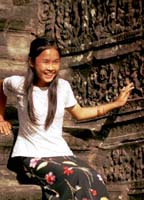 |  | Portrait of young girl © UNESCO/Georges Malempré |  |
The association and active participation of the populations in the tourism development programme is essential if "quality tourism" is to be achieved. This includes safeguarding of sites, smooth operation of tourist infrastructures and services, and creation of small businesses. The resulting victory over poverty – today some 36 per cent of the Cambodian population live below the poverty line – will help to restore human dignity, and that of children in particular, as well as reduce begging and improve the nutritional, educational and health status of the population. A seminar for training of educators in lasting development of tourism was organized at Siem Reap in September-October 2003 by APSARA, UNESCO and an ONG, AIDETOUS. It resulted in the training of 16 young Cambodians in lasting development of tourism for the purpose of creating awareness among tourist professionals, tourists and villagers in ethical tourism. Field experiences were carried out in three villages on the Angkor site – Sra Srang, Prek Toal and Ron Tani – with the following components : information, dialogue, villagers’ suggestions, and drafting of recommendations and micro-programmes (e.g. creation of a production and sales centre for craft items and organization of a guest-house for tourists and a "children’s house"). Follow-up activities will lay stress on training of new educators, with the focus on women this time in specialties that were absent from the first promotion, i.e. the collection of data to assess employment potentials and abilities, an awareness campaign among administrators of villages, districts and pagodas and primary school teachers, and support to the creation of small businesses. This seminar for training of educators in lasting tourism and its follow-up programme are in line with the proposals set out in the Declaration of Paris. The establishment of lasting tourism that can attract growing numbers of "new tourists" (more sensitive to ethics and the quality/price services ratio, and more curious about ways of life and their contemporary manifestations rather than just the past) will make it possible to promote Cambodia as "The alternative South-East Asian destination". Following the "Save Angkor" appeal of ten years ago, a new appeal is now being made to visit Angkor while preserving the "Khmer smile".
|


